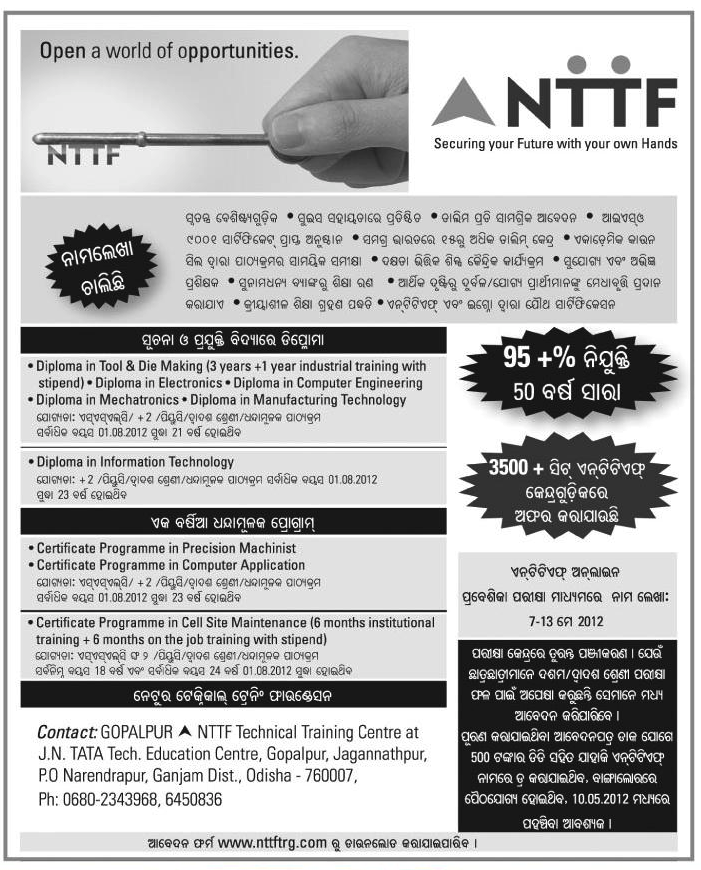The website of NTTF is at http://www.nttftrg.com/index.htm. Currently it has one center in Odisha in Gopalpur. They had earlier listed a center in Kalinganagar, but it is no longer listed in http://www.nttftrg.com/contactus.html#add13. A training program, diploma or a PGdiploma from NTTF almost guarantees a job; See their campus placement data at http://www.nttftrg.com/placement.html.
Recently I saw two of their ads which are given below. More and more people should consider doing a program at NTTF and Odisha government should help in the establishment of more NTTF centers in Odisha.


April 29th, 2012
Following is from an article in livemint.
In a departure from the current trend in business education, the Xavier Institute of Management, Bhubaneswar (XIMB) is opening its own university and taking away some of its courses from what it describes as a restrictive All India Council for Technical Education (AICTE) accreditation process. This will allow it to impart “innovative courses”.
To be named Xavier’s University, the institution will start its first campus in Orissa’s Puri district, followed by two more campuses in Sambalpur and Balangir districts.
“The AICTE has a lot of restrictions when it comes to expansion,” XIMB director P.T. Joseph said over the telephone from Bhubaneswar. “Now, we have got a go-ahead from the state government to start our own university.”
… Joseph said the institute will spend about Rs70 crore in the first phase of the university plan, of which Rs20 crore will come from the state. While the first campus in Pipli, Puri, will be spread across 35 acres, the Sambalpur and Balangir campuses will be built on 25 acres and 15 acres, respectively. The university will be set up as a private one under the state’s rules, which means it will have more autonomy. “There will be more investment as we progress,” Joseph said.
… To start with, XIMB will offer students the rural management course without AICTE accreditation. “XIMB will remain as an institute under the AICTE umbrella. If they create problems, then we have to think otherwise. But we are taking our (two-year) rural management course to the university from next year when the university starts operation,” Joseph said. The institute will also run a master’s programme on public health in collaboration with the Tata Institute of Social Sciences. It will also offer its three-continent master of global management programme under the university.
XIMB’s plan is a smart way of tackling issues related to AICTE, said Pramath Sinha, founding dean of the Indian School of Business, Hyderabad.
… Allowing serious players to open universities is creating an ecosystem that’s free of excessive control, he said. Sinha is planning to open a university in Haryana under the state’s laws.
Joseph said Xavier’s University will offer both undergraduate and post-graduate programmes in areas such as environmental management, microfinance, healthcare management and disaster management. Orissa chief minister Naveen Patnaik will lay the foundation of the campus on Saturday, according to an official invitation.
The state will pass a legislation to open the private university soon and till that time XIMB will call them additional campuses, instead of a university, the institute’s spokesperson said.
April 28th, 2012
Following is an excerpt from a report in Hindustan Times.
Higher education in the country is set to get a boost with the HRD ministry finalising plans worth Rs. 80,000 crore inorder to improve access to colleges and universities.
The UPA government has embarked upon an ambitious plan to double the gross enrollment ratio (GER), from present around 17% to 30% by the year 2020. For this, there would be a need of several new universities and colleges across the country.
HRD minister Kapil Sibal on Wednesday told Lok Sabha that 200 new universities and a degree college in each district of India will be opened in the next five years. “We have asked for Rs. 20,000 crore for opening new universities in the 12th plan,” he said.
In addition to new institutions, many of the existing colleges will be upgraded either into universities or autonomous colleges having powers to award degrees.
The budget for revitalising the higher education will be Rs. 80,000 crore, the biggest ever allocation for higher education.
A large amount of this money will be awarded to state governments to improve higher education in rural areas. This, by increasing the Central government share in higher education funding to the states.
As of now, the Centre shares just 35% of the cost of starting a new higher education institution. In the 12th plan (2012-17), Sibal said, the government proposes to increase the Central share to 65% and 90% for the north-eastern states.
This, according to the ministry, will give an incentive to the state governments to submit proposals for starting new higher education institutes. Many state governments have been reluctant to seek funds from the Centre because they had to assure 65% funds to start the project.
April 26th, 2012
The following is an excerpt from http://ibnlive.in.com/news/coming-up-innovation-centre-for-climate-change/251002-60-117.html.
India will very soon have the first-ever Innovation Centre for Climate Change (ICCC) to cover the Bay of Bengal. It will come up on the Konark-Puri road. The Centre will function under the Indian Institute of Technology, Bhubaneswar (IITB).
The Bay of Bengal Coastal Observatory (BOBCO) as it has been named will study the behaviour of the Bay of Bengal. With the completion of the observatory, the country will be able to forecast extreme weather conditions and collect data about the ocean behaviour and numerous other details like the physical, chemical, biological and Geo-scientific data. “All this information will be instrumental in preparing a model for understanding cyclone. We would have understood the 1999 cyclone better if we had this observatory back then,” said Earth, Ocean and Climate Sciences Prof Prem Chand Pandey.
Its working will be different from the Meteorological Department (MET) as the ICCC will look into the causes behind the occurrences in the ocean while MET department records the ocean behaviour and gives continuous information.
The ICCC will come up along with the School of Earth, Ocean and Climate Science (SEOCS) under IITB. The SEOCS, which will come up at Arugul, will be headed by Prof Subhashish Tripathy. The State Government had allotted around 936 acre land for the construction of the SEOCS. It also recently allotted around 75 acres for setting up of the observatory.
… For the setting up of the observatory, IITB is working closely with University of Massachusetts and University of South Hampton. They will also conduct the Ocean Instrumentation Training Programme to train people with the advanced instruments that will be used in the ICCC. “There will be around 12 faculties initially, but with the gradual growth of the school, more and more experienced faculties will be brought in,” said Tripathy. The recruitment process has already begun. The institute also has ambitious plans to conduct research in the field of land, ocean and atmosphere, added Pandey.
April 23rd, 2012
Following is rearranged from http://pib.nic.in/newsite/erelease.aspx?relid=82396. The sub-headings are added by me.
On 14 Innovation Universities
Recognizing the need for leveraging on the creative knowledge, we are also planning to set up 14 Innovation Universities, to begin with, aiming at world class standards which will set benchmarks for excellence for the Central and State Universities. Each of the Innovation University shall consistently aspire for attainment of pinnacle of knowledge and will provide the knowledge manpower of the country in training professionals, specialists, scientists and researchers needed by the supporting national innovation system. Government has already framed a legislation for Universities of Research and Innovation which will provide a facilitating framework for creation of these institutions. These universities would be embedded in ecosystems developed for promoting synergies among education, research and incubation centres or industry
In order to be truly innovative, these Innovation Universities will not be clones of each other, but will focus on one deep theme of innovation and will focus on one area or problem of global significance in general and India in particular, by building an ecosystem of research and teaching around related discipline and fields and will search for solutions that are globally valid. For example, such areas may focus on urbanization public health, water security, environmental sustainability, digital literacy etc. The proposed universities will be autonomous in true sense, designing their own knowledge disciplines, admission criteria, academic programmes, credit systems etc. The programmes shall also facilitate horizontal mobility across disciplines.
…
We have realized that traditional models of public funded universities are not enough as the investment required is too high. We do acknowledge the need for policies to encourage private investment in higher education and the Foreign Education Providers’ Bill, now under consideration of the Parliament, is a decisive step in that direction. Although Government will be prime facilitator of the new innovation universities and innovation clusters, it is also proposed to focus on Public Private Partnerships (PPP) mode. It is also proposed to collaborate with Universities elsewhere in the world and they may be invited to set up similar such institutions in India and Government will support its research and establishment needs and teaching including scholarships may be funded by the promoting university. New Greenfield Innovation Universities supporting an already existing University/Institution of repute to attain world class standards through innovation in chosen areas of knowledge as well as Identification of some educational hubs in the country, where a few institutions of excellence are located and create an architecture of Innovation University by promoting synergy for teaching and research among such institutions are the models that we are aiming at promoting.
Cluster Innovation Centers
We have also planned creation of Cluster Innovation Centres in our Higher Education Institutions for promoting linkages for innovations, and R&D for solving the real problems and creation of products and processes for which systemic reforms have already been initiated for facilitating the linkages with industry and society. The Cluster Innovation Centres will provide a platform for the University and its partners to forge linkages between various stakeholders from industry and academia and to act as catalysts and facilitators. We have prepared a blueprint for setting up about 50 innovation centres of excellence in different frontier areas. Cambridge Cluster in UK as well as Trinity College founded by Cambridge Science Park are two prominent examples from UK which have promoted the growth of enterprise and innovation and created thriving innovation ecosystems. Such examples also exists in US (MIT, Silicon Valley – Stanford University), Israel, Germany, Sweden, Japan, China and Korea. Biggest strength of these clusters has been the cooperation and collaboration, where all actors are connected in symbiotic relationships. We are also aiming to scale up such National Innovation Clusters. We already have a few such schemes in the form of Technology Business Incubators and Technology Entrepreneur Promotion.
Collaboration with UK
The Cluster Innovation Centers and Innovation Universities are the specific areas in which we seek further collaboration with UK Institutions who have already innovated and scaled up by creating appropriate framework and institutionalized the same successfully.
Meta Universities
Seizing the new opportunities and leveraging the National Knowledge Network, the National Innovation Council has also proposed to create the first Global Meta University. With a network of Universities coming together offering courses cutting across disciplines, the Meta University will reinterpret the concept of a University as not just a traditional, physical space of learning, but as a repository of knowledge and information that can be delivered in multiple ways, and can be accessed from anywhere and anytime. It will seek to enhance the learning experience through new and innovative delivery models of education that allow students and institutions to collaborate in unprecedented ways. Thus the 21st century meta-university would be a network and an ecosystem rather than a single brick and mortar space – a Facebook of Institutions. A few central institutions located at Delhi, like Jawaharlal Nehru University, University of Delhi, Jamia-Millia Islamia and IIT-Delhi have already initiated steps to constitute a meta-university. Here also, we are looking forward to collaborate with Institutions from the United Kingdom in the next step for creation of global meta alliances. Though the internet and technology are fundamental to this conception of the Meta University, at the crux is not a new technology but a ‘new pedagogy’ that is more in tune with the requirements of the knowledge society of the 21st century. In such an environment there is a greater focus on a learner centric, collaborative model that allows continuous learning from the environment.
April 20th, 2012
So far IIT Bhubaneswar only offered B.Tech and Ph.D programs. It has now advertised its new M.Tech programs which are actually joint M.Tech-Ph.D programs that allow one with GPA greater than 8 (after doing the M.Tech coursework) to seamlessly transition to a Ph.D program or just get an M.Tech degree. The details of the program is given at http://www.iitbbs.ac.in/applicationforms/advt/Information-for-Admission-to-Joint-M.Tech.-Ph.D.Programme.pdf.
Following are some excerpts from that.
INDIAN INSTITUTE OF TECHNOLOGY BHUBANESWAR
INFORMATION FOR JOINT M. TECH. – PH.D. PROGRAMME Joint M. Tech. – Ph. D. Programme in:
* Applied Geosciences
* Civil Engineering
* Climate Science & Technology
* Electronics & Communication Engineering
* Materials Science and Engineering
* Mechanical Engineering
Selection: Valid GATE score followed by Written Test and/or Interview. Opting for Ph. D. Programme:
Desirous students with CGPA greater than equal to 8 after the 3rd semester of the M. Tech. programme with an aptitude towards research can opt for Ph. D. Those students with CGPA less than 8 will exit with M. Tech. degree after successfully completing the fourth semester and the credit requirements.
… Number of Seats: 18 in each programme. (Reservation as per GOI norms applicable).
In addition to the above mentioned joint M.Tech/Ph.D program IIT Bhubaneswar has also advertised for direct admission to its Ph.D programs in each of its seven schools .
See http://www.iitbbs.ac.in/applicationforms/advt/Information-for-Admission-to-Ph.D.Programme.pdf for details.
With these programs added and currently with only 120 B.Tech students admitted per year, IIT Bhubaneswar will have more graduate students (M.Tech and Ph.D) admitted per year than undergraduate students (B.Tech). This is a good direction and IIT Bhubaneswar should strive to have more graduate students than undergraduate students thus putting emphasis on research.
April 14th, 2012
Following are recent news snippets on this.
From http://www.igovernment.in/site/14-world-class-varsities-now-12th-plan dated 30th March 2012.
The proposal for setting up of world class universities in 14 states is awaiting clearance by the Law Ministry, Minister of State for Human Resource Development D Purandeswari said.
Replying to questions in the Rajya Sabha, Purandeswari said the government is also planning to set up higher educational institutions in the 374 educationally backward blocks in the country.
The National Development Council had approved setting up of 14 world-class universities for innovation across the 11th and 12th plan periods on the public private partnership model.
The innovation universities are part of the Ministry of Human Resource Development’s (MHRD) "brain gain" policy to attract global.
The proposed universities will be set up in Bhubaneswar, Kochi, Amritsar, Greater Noida, Patna, Guwahati, Kolkata, Bhopal, Gandhinagar, Coimbatore, Mysore, Pune, Visakhapatnam and Jaipur.
From http://twocircles.net/2012apr10/14_innovation_universities_be_set_india.html dated April 10th 2012.
Fourteen innovation universities would be set up in the country during the 12th Five Year Plan, Union Minister of State for Planning, Science and Technology and Earth Sciences Ashwani Kumar said here Tuesday.
From http://ibnlive.in.com/generalnewsfeed/news/govt-to-set-up-14-innovation-universities/984605.html dated April 10th 2012.
Chandigarh, Apr 10 (PTI) The government today said it will set up 14 innovation universities during the 12th five- year plan. "We are going to open 14 innovation universities," Union Minister of State for Planning Ashwani Kumar told reporters here. Kumar was in the city to review the flagship programmes of the state. The innovation universities are aimed at making India a global knowledge hub. Each one to be built around a theme or subject, these unique universities will enjoy total autonomy with regard to appointments, collaborations, resource generation and nomenclature of degrees awarded by it.
From http://www.deccanchronicle.com/channels/cities/chennai/innovation-varsity-kovai-soon-066 dated April 2nd 2012.
The Union government has added another feather to Tamil Nadu’s cap by proposing to set up a university of innovation at Coimbatore.
This will be one of the 14 universities to be set up in the country.
The Centre will table Universities for Innovations Bill, 2011, in Parliament soon.
The Bill will provide an in-principle approval for establishing universities for innovation. Some of the innovation universities will be in partnership with private players also and they will be made eligible for the government’s funding for research activities and student scholarships.
The Union HRD minister will discuss the proposal with education secretaries of all state governments on April 13 in New Delhi.
April 10th, 2012
If this is true, then this is great news. Now the infrastructure and teaching in the schools need to improve so that the students that are enrolled get a good education and their time is not wasted.

April 6th, 2012


